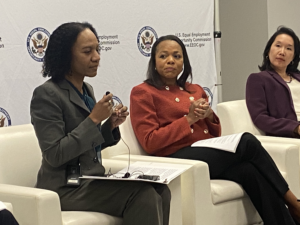Budget shortfalls forcing EEOC to prepare for 1-day furlough
Charlotte Burrows, chairwoman of the EEOC, told employees on July 30 that a combination of budget factors is forcing the agency to plan for an Aug. 30 furlough.
Employees at the Equal Employment Opportunity Commission are facing a possible one-day furlough on Aug. 30 unless the agency can close a budget shortfall.
Charlotte Burrows, chairwoman of the EEOC, told employees on July 30 that a combination of a flat budget for fiscal 2024, the 5.2% pay raise and higher overall operating costs are putting the agency in a tough budget spot.

“To successfully navigate these financial challenges, the agency has taken steps in several areas. We filled only a handful of critical positions this fiscal year; made significant across-the-board cuts, with deeper cuts to some programs — for example, permitting travel only for mission-critical reasons; eliminating most training funds; and canceling certain online subscriptions. Additionally, we have delayed certain big-ticket items, including office moves and refurbishments,” Burrows wrote to employees in an email obtained by Federal News Network. “Despite these broad and strategic cuts, we still face a potential funding shortfall this fiscal year. Therefore, out of an abundance of caution, we have made the incredibly difficult decision to notice up to eight hours of furlough for all employees on Friday, Aug. 30. Until then, we will continue to search for additional savings and remain hopeful that we ultimately may be able to avoid the furlough or limit the furlough to four hours. However, we have waited as long as we could in the fiscal year to make this determination while still ensuring adequate notice to employees and allowing enough time for savings from the furlough to prevent a deficit at the end of the fiscal year.”
The EEOC received $455 million from Congress for this year after requesting $481 million.
For 2025, the EEOC requested $488.2 million. House lawmakers reduced EEOC’s budget even further, allocating $420 million, which is $35 million below 2024 and $68 million below the request. The Senate, meanwhile, approved the White House’s request of $488 million for 2025.
“EEOC has been underfunded and understaffed for decades — and now with Congress freezing the agency’s budget at last year’s level, we are seeing this unfortunate result,” said Rachel Shonfield, American Federation of Government Employees Council 216 President, in a statement to Federal News Network. “EEOC employees will be forced to lose up to a day’s pay at the end of August unless the agency can scrimp together enough money to make payroll and keep the lights on. Workers facing discrimination on the job are facing longer wait times for appointments because the agency does not have enough front-line staff, and effectively shutting down operations for a day will only make those wait times longer. AFGE is calling on Congress to provide the agency with the resources it needs to fund its operations and provide the public with the services they deserve. There is also a practical step that the agency can take, which is strategically increasing remote work flexibility to reduce rent spending — this is a cost-saving measure our union has urged the agency to take.”
EEOC looking for additional savings
An EEOC spokesman said the agency will continue to look for alternative sources of savings that would allow them to avoid a furlough.
“[We] are notifying employees now of this possibility to allow them time to plan. We are continuing to increase efficiencies and will accrue more cost savings for the rest of the year. The agency’s estimated daily payroll costs are about $1.3 million,” the spokesman said.
In June, Burrows said the EEOC faced bigger challenges this year than maybe ever before in its nearly 60-year history, including having to implement a hiring freeze.
“It’s very difficult,” Burrows said. “When someone leaves retirement or for whatever reason, we’re not able to replace them right now. So, by definition, we’re constantly having to figure out how to manage that and to be fair to our own workforce.”
Employee furloughs due to budget cuts are not a common occurrence. They mostly happen at smaller agencies. For example last October, the chairman of the Federal Labor Relations Authority warned the agency’s budget shortfalls could lead to a furlough. Susan Tsui Grundmann said for fiscal 2024, Congress promised $29 million, the same level as 20 years ago.
“We’re talking furloughs, beginning as early as next year. Furloughs for the people who process the cases, investigate the charges, mediate/litigate these matters, and issue decisions. They will be sent home,” Grundmann warned.
Grundmann said staffing has already dropped by 50% over the years, as caseloads have grown. FLRA has not furloughed employees this year.
In 2020, the U.S. Citizenship and Immigration Service also warned of furloughs because of funding short falls because of the pandemic. Congress ended up providing funding to USCIS to avoid any furloughs.
Final decision for furlough still to come
And, of course, every year that Congress brings the government on the brink of a partial shutdown, federal employees are at risk of a furlough. There is less than two months left in 2024 and lawmakers aren’t close to finalizing any spending bill.
But the EEOC situation is different than the annual end of fiscal year funding lapse. The agency is closer to the decision to furlough employees than the government has experienced for the last four years.
Sheila Clark, EEOC’s deputy chief human capital officer, wrote in a memo to employees that they will be notified once a final decision is made about how many hours the agency needs to furlough employees.
“Annual, sick, court, or military leave which has been approved for Aug. 30 will be recorded as an administrative furlough and you will be placed in a non-pay status for the period of the administrative furlough,” Clark wrote. “At this time, we do not reasonably anticipate the need for an administrative furlough beyond the eight hours on Aug. 30. However, should additional administrative furlough days be necessary, employees will be given a separate notice. We recognize the difficult personal financial implications of any furlough, no matter how limited its length.”
Copyright © 2025 Federal News Network. All rights reserved. This website is not intended for users located within the European Economic Area.
Jason Miller is executive editor of Federal News Network and directs news coverage on the people, policy and programs of the federal government.
Follow @jmillerWFED






